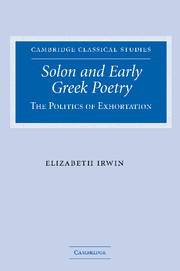Book contents
- Frontmatter
- Contents
- Acknowledgements
- List of abbreviations and editions
- Introduction
- PART I THE POLITICS OF EXHORTATION
- PART II POLITICAL POETICS: SOLON'S EUNOMIA
- PART III POETRY AND POLITICAL CULTURE
- Introduction
- 7 Solon and the language of tyranny
- 8 Rewriting (some) history: Solon and Peisistratus
- Conclusion
- Appendix I Who were Tyrtaeus' gymnetes?
- Appendix II λυκάβαντος: when the wolf comes?
- Bibliography
- General index
- Index locorum
7 - Solon and the language of tyranny
Published online by Cambridge University Press: 05 November 2009
- Frontmatter
- Contents
- Acknowledgements
- List of abbreviations and editions
- Introduction
- PART I THE POLITICS OF EXHORTATION
- PART II POLITICAL POETICS: SOLON'S EUNOMIA
- PART III POETRY AND POLITICAL CULTURE
- Introduction
- 7 Solon and the language of tyranny
- 8 Rewriting (some) history: Solon and Peisistratus
- Conclusion
- Appendix I Who were Tyrtaeus' gymnetes?
- Appendix II λυκάβαντος: when the wolf comes?
- Bibliography
- General index
- Index locorum
Summary
In this chapter, I adduce five instances to demonstrate the degree to which Solon's poetry may be seen to exploit contemporary political discourse. With these examples, I focus on Solon's use of language associated with the tyrant: language which allows Solon not only to occupy a distinctive and explicitly positive relationship with the δῆμος, but also to delineate a powerful autocratic position ambiguously related to tyranny. This discussion will be informed by a particular understanding of the relationship between language and political change, namely that linguistic disagreements are also disagreements about the social world to which they belong. Certain political and social concepts, especially those with evaluative force, by their very nature defy perfect consensus amongst those who use them. Their meaning is an issue of continual contestation, whose implications extend far beyond the solely linguistic realm. Political vocabulary is especially dense with such ‘essentially contested’ concepts, and political debate is often characterised by different sides trying to champion their own meanings of key concepts with which to defend, legitimise and promote their own political programme. Moreover, such conflicts in meaning, already political in themselves, offer manifold opportunities for sagacious political actors to exploit.
Although this view of political and linguistic contest draws on the work of recent scholars, it is a point Thucydides had already explicitly recognised in his description of stasis in Corcyra. How such instances of the influence of contemporary political discourse are to be identified, however, raises complex questions of method.
- Type
- Chapter
- Information
- Solon and Early Greek PoetryThe Politics of Exhortation, pp. 205 - 262Publisher: Cambridge University PressPrint publication year: 2005



